专四语法总结
专四语法
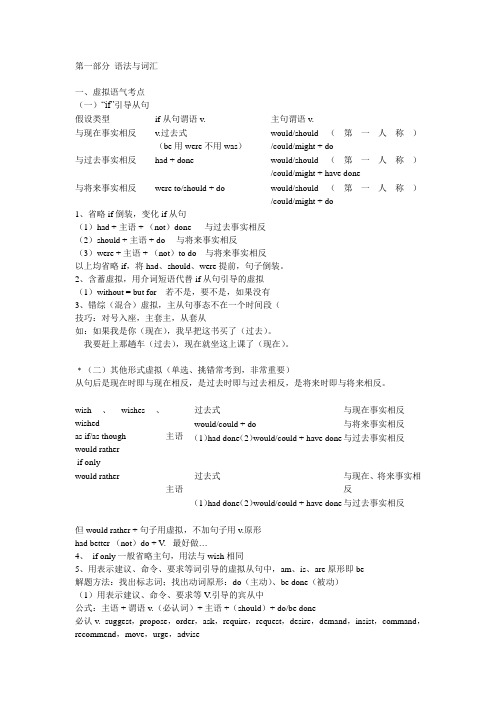
第一部分语法与词汇一、虚拟语气考点(一)“if”引导从句假设类型if从句谓语v. 主句谓语v.与现在事实相反v.过去式(be用were不用was)would/should(第一人称)/could/might + do与过去事实相反had + done would/should(第一人称)/could/might + have done与将来事实相反were to/should + do would/should(第一人称)/could/might + do1、省略if倒装,变化if从句(1)had + 主语 + (not)done 与过去事实相反(2)should + 主语 + do 与将来事实相反(3)were + 主语 + (not)to do 与将来事实相反以上均省略if,将had、should、were提前,句子倒装。
2、含蓄虚拟,用介词短语代替if从句引导的虚拟(1)without = but for 若不是,要不是,如果没有3、错综(混合)虚拟,主从句事态不在一个时间段(技巧:对号入座,主套主,从套从如:如果我是你(现在),我早把这书买了(过去)。
我要赶上那趟车(过去),现在就坐这上课了(现在)。
﹡(二)其他形式虚拟(单选、挑错常考到,非常重要)从句后是现在时即与现在相反,是过去时即与过去相反,是将来时即与将来相反。
wish、wishes、wishedas if/as though would rather if only 主语过去式与现在事实相反would/could + do 与将来事实相反(1)had done(2)would/could + have done 与过去事实相反would rather主语过去式与现在、将来事实相反(1)had done(2)would/could + have done 与过去事实相反但would rather + 句子用虚拟,不加句子用v.原形had better (not)do + V. 最好做…4、 if only 一般省略主句,用法与wish相同5、用表示建议、命令、要求等词引导的虚拟从句中,am、is、are原形即be解题方法:找出标志词;找出动词原形:do(主动)、be done(被动)(1)用表示建议、命令、要求等V.引导的宾从中公式:主语 + 谓语v.(必认词)+ 主语 +(should)+ do/be done必认v. suggest,propose,order,ask,require,request,desire,demand,insist,command,recommend,move,urge,advise(2)用于与建议、命令、要求等V.意义类似的形容词所引导的从句公式:It is + adj. (必认词)+ that + 主语 +(should)+ do/be done必认adj. suggested,proposed,ordered,asked,required,requested,desired(desirable),demanded,commanded,recommended,urgent,advisable,important,vital,essential,necessary, imperative(3)与表示建议、命令、要求等v.相类似的n.引导的表语从句和同位语从句表从公式:主语 + 系词 + that + 主语(should) + do/be done同位从公式:n. + that + 主语(should)+ do/be done必认n. suggestion,proposal,order,requirement,request,desire,demand,insistence,requirement,request,desire,demand,insistence,motion,recommendation,advice6、 It's/was/ + time + that + 主语 + did(过去式)早该到…的时间了/high time/about time7、跳层虚拟公式:真实,otherwise / or + 虚拟虚拟,but + 真实(一般考过去时)特点:真实——过去时或 must have done,对过去肯定猜测虚拟——would / could + have done(三)情态v. + have done ,表示对过去事情的推测must + have done 肯定,没有musn't(表禁止…)could + have done 本能够,可能做(但未做)may + have done 本可能,或许might + have done 本可能should = ought to + have done 本应做,而未做(含责备)shouldn't = oughtn't to + have done 本不应做而做了(含责备)needn't + have done 没有必要做而做了(无责备)need 情态v.“必要” + v.实义v.“需要” + need doing(形式主动,实际被动) = need to be done“需要”need + to do二、非谓语动词(一)不定式: to do / not to do1、形式(时态/语态), vt.(vi.只有主动)基本形式:主动被动﹡一般式to do to be done﹡完成式to have done to have been done进行式to be doing ×完成进行式to have been doing ×注意:不定式的一般式表示动作与主句的动作将要发生或同时发生,而不定式的完成式表示动作要先于主句的动作前发生,不定式的完成式不能作定语。
完整版专四英语语法考点分析解析
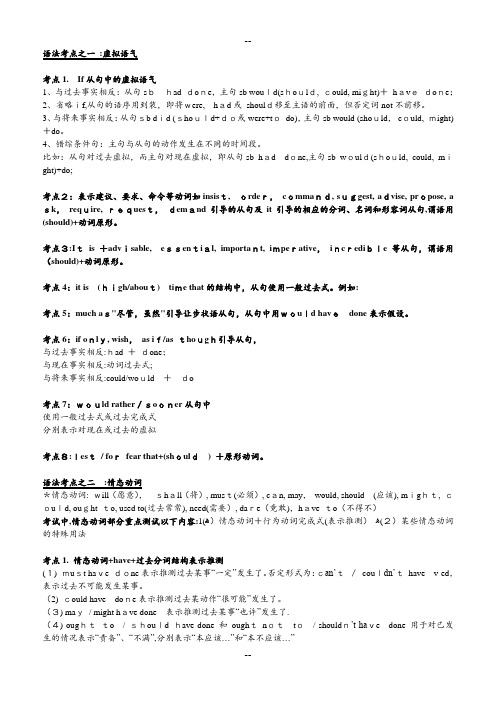
语法考点之一:虚拟语气考点1.If从句中的虚拟语气1、与过去事实相反:从句sbhad done,主句sb would(should, could, might)+havedone;2、省略if,从句的语序用到装,即将were,had或should移至主语的前面,但否定词not不前移。
3、与将来事实相反:从句sb did (should+do或were+todo),主句sb would (should,could, might)+do。
4、错综条件句:主句与从句的动作发生在不同的时间段。
比如:从句对过去虚拟,而主句对现在虚拟,即从句sb had done,主句sb would(should, could, might)+do;考点2:表示建议、要求、命令等动词如insist,order,command, suggest, advise, propose, a sk,require, request,demand引导的从句及it引导的相应的分词、名词和形容词从句,谓语用(should)+动词原形。
考点3:Itis +advisable,essential, important, imperative,incredible等从句,谓语用(should)+动词原形。
考点4:it is(high/about)time that的结构中,从句使用一般过去式。
例如:考点5:much as"尽管,虽然"引导让步状语从句,从句中用would havedone表示假设。
考点6:if only, wish,as if/as though引导从句,与过去事实相反:had +done;与现在事实相反:动词过去式;与将来事实相反:could/would+do考点7:would rather/sooner从句中使用一般过去式或过去完成式分别表示对现在或过去的虚拟考点8:lest/ forfear that+(should) +原形动词。
专四常考语法点汇总定稿版

专四常考语法点汇总精编W O R D版IBM system office room 【A0816H-A0912AAAHH-GX8Q8-GNTHHJ8】语法与词汇专项语法核心考点一:从属分句复合句= 主句+从句(1个或1个以上)要点1从属分句是复合句必不可少的组成部分,以语法功能作为分类标准,从属分句可以分为状语从句、关系从句(即定语从句)和名词性从句。
其中状语从句可分为时间、地点、原因、结果、程度、目的、条件、让步和方式等;名词性从句可分为主语从句、宾语从句、表语从句、同位语从句。
要点2 状语从句的考点集中在方式、条件、让步、方式和时间状语从句上;关系从句的考点集中在关系代词的选择,限制性定语从句和非限制性定语从句的区别;名词性从句的考点集中在宾语从句和同位语从句。
一状语从句状语从句真题剖析:1 Nine is to three _____ three is to one. (2008, 53)A. whenB. thatC. whichD. what2 ______ he wanted to go out with his friends at the weekend, he had to stay behind to finish his assignment. (2008, 55)A. Much thoughB. Much asC. As muchD. Thouth much3 Men differ from animals ____ they can think and speak. (2008, 54)A. for whichB. for thatC. in thatD. in which4 They stood chatting together as easily and naturally as ____. (2008, 60)A. it could beB. could beC. it wasD. was5 The couple had no sooner got to the station ______ the coach left. (2009,60)A. whenB. asC. untilD. than6 ____ the boss says, it is unreasonable to ask me to work overtime without pay. (2010,55)A. WhateverB. WheneverC. WhicheverD. However7 Fool ____ Jerry is, he could not have done such a thing.A. whoB. asC. likeD. that8 He asked me to lend him some money, which I agreed to do, ___ that he paid me back the following week. (2005)A. on occasionB. on purposeC. on conditionD. only if9 Which of the following contains an adverbial clause of cause?A. I got a job as soon as I left university.B. As there was on answer, I wrote again.C. You must do the exercise as I show you.D. Wealthy as he is, Mark is not a happy man.状语从句重点总结:(一)条件状语从句:表示条件或假设,通常由以下连词或结构引导:★特别提醒几种不常用的条件状语从句举例:In the event that she can not arrive on time, we will go first. Suppose it snowed, we would still go.Say what he said were true, what would you do about it?(二)让步状语从句:含有“虽然,尽管,即使”之意,主要引导词有:★特别提醒1. 几种不常用的让步状语从句举例:In spite of the fact that he was deaf and dumb, he had a genius for music. While the grandparents love the children, they are strict with them.Much as she needed the job, she had to refuse.For all that there were a lot of difficulties, he finally entered the final competition and won.Granted you have made much progress, you should not be conceited.2. 用了although或though,就一定不能再后面的从句中同时用but,但是though可以和yet 连用。
英语专四语法
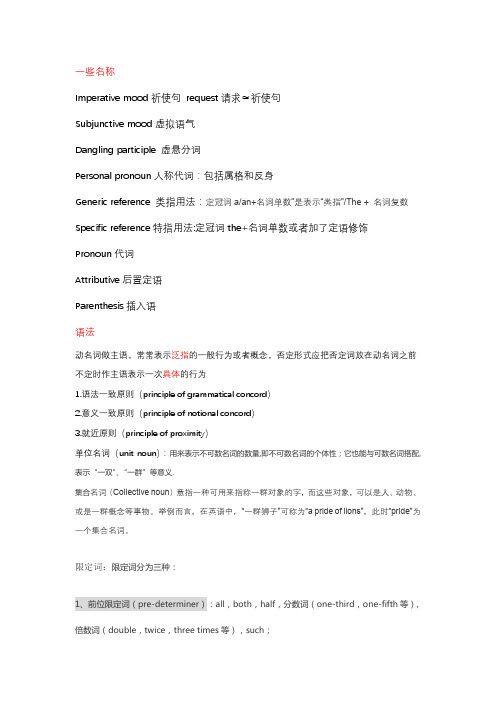
一些名称Imperative mood祈使句request请求≈祈使句Subjunctive mood虚拟语气Dangling participle 虚悬分词Personal pronoun人称代词:包括属格和反身Generic reference 类指用法:定冠词a/an+名词单数”是表示“类指”/The + 名词复数Specific reference特指用法:定冠词the+名词单数或者加了定语修饰Pronoun代词Attributive后置定语Parenthesis插入语语法动名词做主语,常常表示泛指的一般行为或者概念,否定形式应把否定词放在动名词之前不定时作主语表示一次具体的行为1.语法一致原则(principle of grammatical concord)2.意义一致原则(principle of notional concord)3.就近原则(principle of proximity)单位名词(unit noun):用来表示不可数名词的数量,即不可数名词的个体性;它也能与可数名词搭配,表示“一双”、“一群”等意义.集合名词(Collective noun)意指一种可用来指称一群对象的字,而这些对象,可以是人、动物、或是一群概念等事物。
举例而言,在英语中,“一群狮子”可称为“a pride of lions”,此时“pride”为一个集合名词。
限定词:限定词分为三种:1、前位限定词(pre-determiner):all,both,half,分数词(one-third,one-fifth等), 倍数词(double,twice,three times等),such;2、中位限定词(central-determiner):冠词(a,an,the),指示代词(this,that,these,those),不定代词(some,any,either),否定词(no,neither),全称限定词(every,each),所有格(my,your,John's);3、后位限定词(post-determiner):基数词(three,200),序数词(first,second,300th,last),数量词及短语(many,much,little,few,plenty of,a lot of,a large number of)等。
专四语法与词汇
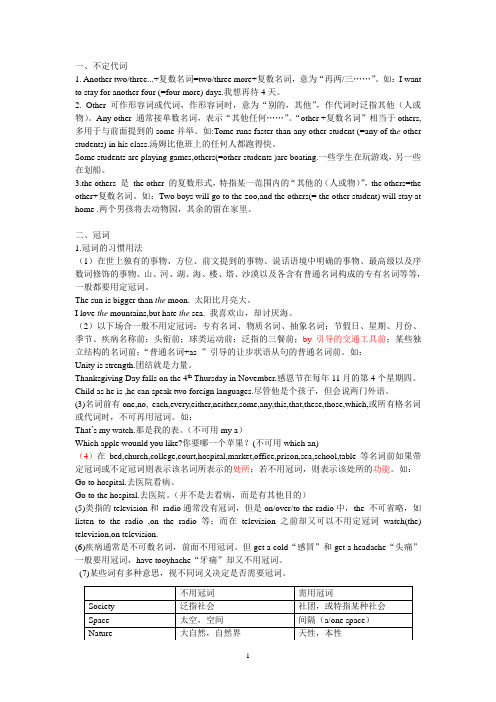
一、不定代词1. Another two/three...+复数名词=two/three more+复数名词,意为“再两/三……”。
如:I want to stay for another four (=four more) days.我想再待4天。
2. Other 可作形容词或代词,作形容词时,意为“别的,其他”,作代词时泛指其他(人或物)。
Any other 通常接单数名词,表示“其他任何……”。
“other +复数名词”相当于others,多用于与前面提到的some并举。
如:Tome runs faster than any other student (=any of th e other students) in his class.汤姆比他班上的任何人都跑得快。
Some students are playing games,others(=other students )are boating.一些学生在玩游戏,另一些在划船。
3.the others 是the other 的复数形式,特指某一范围内的“其他的(人或物)”,the others=the other+复数名词。
如:Two boys will go to the zoo,and the others(= the other student) will stay at home .两个男孩将去动物园,其余的留在家里。
二、冠词1.冠词的习惯用法(1)在世上独有的事物、方位、前文提到的事物、说话语境中明确的事物、最高级以及序数词修饰的事物、山、河、湖、海、楼、塔、沙漠以及各含有普通名词构成的专有名词等等,一般都要用定冠词。
The sun is bigger than the moon. 太阳比月亮大。
I love the mountains,but hate the sea. 我喜欢山,却讨厌海。
(2)以下场合一般不用定冠词:专有名词、物质名词、抽象名词;节假日、星期、月份、季节、疾病名称前;头衔前;球类运动前;泛指的三餐前;by 引导的交通工具前;某些独立结构的名词前;“普通名词+as ”引导的让步状语从句的普通名词前。
专四常考语法点汇总

语法与词汇专项语法核心考点一:从属分句复合句= 主句+从句(1个或1个以上)要点1从属分句是复合句必不可少的组成部分,以语法功能作为分类标准,从属分句可以分为状语从句、关系从句(即定语从句)和名词性从句。
其中状语从句可分为时间、地点、原因、结果、程度、目的、条件、让步和方式等;名词性从句可分为主语从句、宾语从句、表语从句、同位语从句。
要点2 状语从句的考点集中在方式、条件、让步、方式和时间状语从句上;关系从句的考点集中在关系代词的选择,限制性定语从句和非限制性定语从句的区别;名词性从句的考点集中在宾语从句和同位语从句。
一状语从句状语从句真题剖析:1 Nine is to three _____ three is to one. (2008, 53)A. whenB. thatC. whichD. what2 ______ he wanted to go out with his friends at the weekend, he had to stay behind to finish his assignment. (2008, 55)A. Much thoughB. Much asC. As muchD. Thouth much3 Men differ from animals ____ they can think and speak. (2008, 54)A. for whichB. for thatC. in thatD. in which4 They stood chatting together as easily and naturally as ____. (2008, 60)A. it could beB. could beC. it wasD. was5 The couple had no sooner got to the station ______ the coach left. (2009,60)A. whenB. asC. untilD. than6 ____ the boss says, it is unreasonable to ask me to work overtime without pay. (2010,55)A. WhateverB. WheneverC. WhicheverD. However7 Fool ____ Jerry is, he could not have done such a thing.A. whoB. asC. likeD. that8 He asked me to lend him some money, which I agreed to do, ___ that he paid me back the following week. (2005)A. on occasionB. on purposeC. on conditionD. only if9 Which of the following contains an adverbial clause of cause?A. I got a job as soon as I left university.B. As there was on answer, I wrote again.C. You must do the exercise as I show you.D. Wealthy as he is, Mark is not a happy man.状语从句重点总结:(一)条件状语从句:表示条件或假设,通常由以下连词或结构引导:★特别提醒几种不常用的条件状语从句举例:In the event that she can not arrive on time, we will go first.Suppose it snowed, we would still go.Say what he said were true, what would you do about it?(二)让步状语从句:含有“虽然,尽管,即使”之意,主要引导词有:★特别提醒1. 几种不常用的让步状语从句举例:In spite of the fact that he was deaf and dumb, he had a genius for music.While the grandparents love the children, they are strict with them.Much as she needed the job, she had to refuse.For all that there were a lot of difficulties, he finally entered the final competition and won.Granted you have made much progress, you should not be conceited.2. 用了although或though,就一定不能再后面的从句中同时用but,但是though可以和yet 连用。
专四语法(做完题总结)
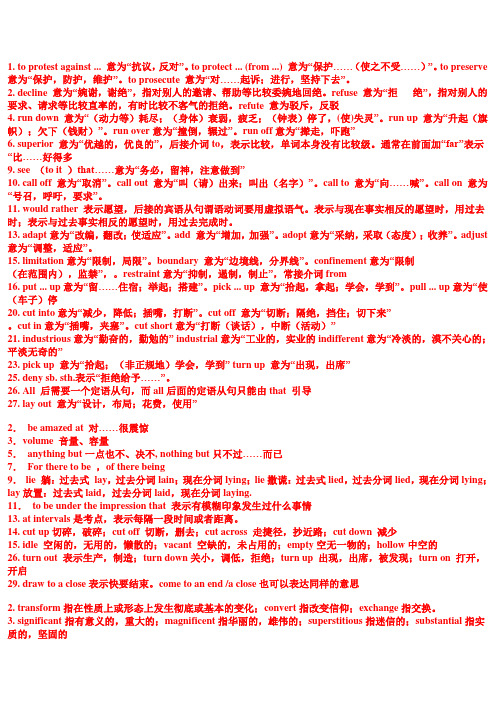
1. to protest against ... 意为“抗议,反对”。
to protect ... (from ...) 意为“保护……(使之不受……)”。
to preserve 意为“保护,防护,维护”。
to prosecute 意为“对……起诉;进行,坚持下去”。
2. decline 意为“婉谢,谢绝”,指对别人的邀请、帮助等比较委婉地回绝。
refuse 意为“拒绝”,指对别人的要求、请求等比较直率的,有时比较不客气的拒绝。
refute 意为驳斥,反驳4. run down 意为“(动力等)耗尽;(身体)衰弱,疲乏;(钟表)停了,(使)失灵”。
run up 意为“升起(旗帜);欠下(钱财)”。
run over意为“撞倒,辗过”。
run off意为“撵走,吓跑”6. superior 意为“优越的,优良的”,后接介词to,表示比较,单词本身没有比较级。
通常在前面加“far”表示“比……好得多9. see (to it )that……意为“务必,留神,注意做到”10. call off 意为“取消”。
call out 意为“叫(请)出来;叫出(名字)”。
call to 意为“向……喊”。
call on 意为“号召,呼吁,要求”。
11. would rather 表示愿望,后接的宾语从句谓语动词要用虚拟语气。
表示与现在事实相反的愿望时,用过去时;表示与过去事实相反的愿望时,用过去完成时。
13. adapt意为“改编,翻改;使适应”。
add 意为“增加,加强”。
adopt意为“采纳,采取(态度);收养”。
adjust 意为“调整,适应”。
15. limitation意为“限制,局限”。
boundary 意为“边境线,分界线”。
confinement意为“限制(在范围内),监禁”,。
restraint意为“抑制,遏制,制止”,常接介词from16. put ... up意为“留……住宿;举起;搭建”。
英语专四语法考点总结
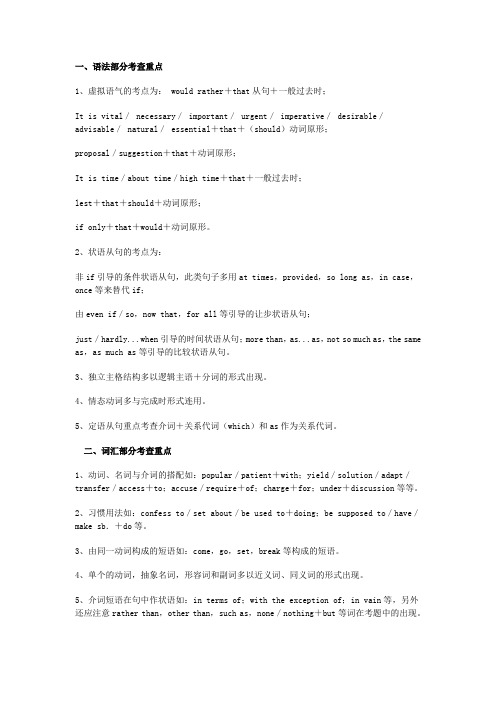
一、语法部分考查重点1、虚拟语气的考点为: would rather+that从句+一般过去时;It is vital/ necessary/ important/ urgent/ imperative/ desirable/advisable/ natural/ essential+that+(should)动词原形;proposal/suggestion+that+动词原形;It is time/about time/high time+that+一般过去时;lest+that+should+动词原形;if only+that+would+动词原形。
2、状语从句的考点为:非if引导的条件状语从句,此类句子多用at times,provided,so long as,in case,once等来替代if;由even if/so,now that,for all等引导的让步状语从句;just/hardly...when引导的时间状语从句;more than,as...as,not so much as,the same as,as much as等引导的比较状语从句。
3、独立主格结构多以逻辑主语+分词的形式出现。
4、情态动词多与完成时形式连用。
5、定语从句重点考查介词+关系代词(which)和as作为关系代词。
二、词汇部分考查重点1、动词、名词与介词的搭配如:popular/patient+with;yield/solution/adapt/transfer/access+to;accuse/require+of;charge+for;under+discussion等等。
2、习惯用法如:confess to/set about/be used to+doing;be supposed to/have/make sb.+do等。
3、由同一动词构成的短语如:come,go,set,break等构成的短语。
英语专四语法总结
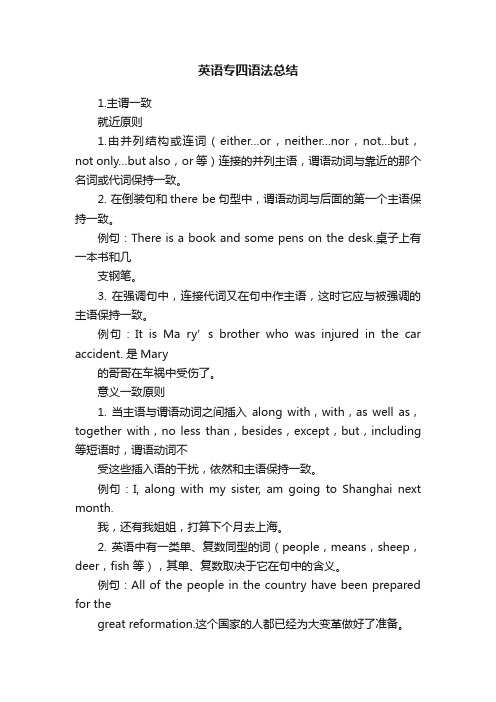
英语专四语法总结1.主谓一致就近原则1.由并列结构或连词(either…or,neither…nor,not…but,not only…but also,or 等)连接的并列主语,谓语动词与靠近的那个名词或代词保持一致。
2. 在倒装句和there be句型中,谓语动词与后面的第一个主语保持一致。
例句:There is a book and some pens on the desk.桌子上有一本书和几支钢笔。
3. 在强调句中,连接代词又在句中作主语,这时它应与被强调的主语保持一致。
例句:It is Ma ry’s brother who was injured in the car accident. 是Mary的哥哥在车祸中受伤了。
意义一致原则1. 当主语与谓语动词之间插入along with,with,as well as,together with,no less than,besides,except,but,including 等短语时,谓语动词不受这些插入语的干扰,依然和主语保持一致。
例句:I, along with my sister, am going to Shanghai next month.我,还有我姐姐,打算下个月去上海。
2. 英语中有一类单、复数同型的词(people,means,sheep,deer,fish 等),其单、复数取决于它在句中的含义。
例句:All of the people in the country have been prepared for thegreat reformation.这个国家的人都已经为大变革做好了准备。
3. 多数情况下,由“what”引导的名词性从句作主语时,其后的谓语动词通常用单数形式。
我只想说:“多保重!”例句:What I want to say is just “ Take care!”.4. 当主语与all,none,any,some等不定代词、形容词连用时,应根据具体句意,来决定其后的谓语动词的单复数。
(完整word版)专四语法重点总结,推荐文档
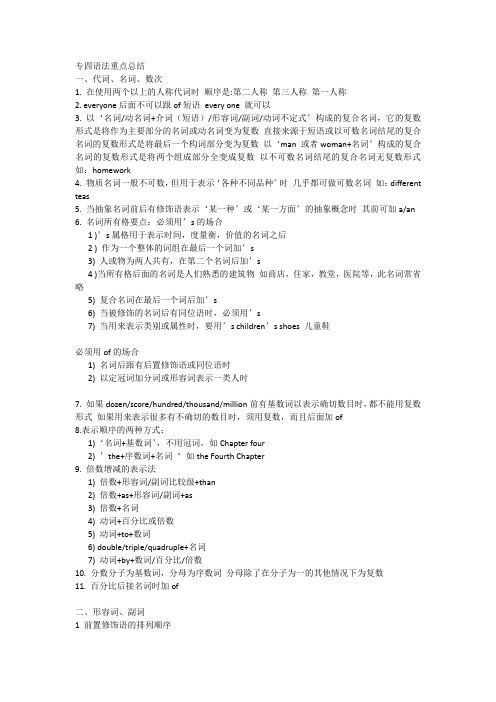
专四语法重点总结一、代词、名词、数次1. 在使用两个以上的人称代词时顺序是:第二人称第三人称第一人称2. everyone后面不可以跟of短语every one 就可以3. 以‘名词/动名词+介词(短语)/形容词/副词/动词不定式’构成的复合名词,它的复数形式是将作为主要部分的名词或动名词变为复数直接来源于短语或以可数名词结尾的复合名词的复数形式是将最后一个构词部分变为复数以‘man 或者woman+名词’构成的复合名词的复数形式是将两个组成部分全变成复数以不可数名词结尾的复合名词无复数形式如:homework4. 物质名词一般不可数,但用于表示‘各种不同品种’时几乎都可做可数名词如:different teas5. 当抽象名词前后有修饰语表示‘某一种’或‘某一方面’的抽象概念时其前可加a/an6. 名词所有格要点:必须用’s的场合1 )’s属格用于表示时间,度量衡,价值的名词之后2 ) 作为一个整体的词组在最后一个词加’s3) 人或物为两人共有,在第二个名词后加’s4 )当所有格后面的名词是人们熟悉的建筑物如商店,住家,教堂,医院等,此名词常省略5) 复合名词在最后一个词后加’s6) 当被修饰的名词后有同位语时,必须用’s7) 当用来表示类别或属性时,要用’s children’s shoes 儿童鞋必须用of的场合1) 名词后跟有后置修饰语或同位语时2) 以定冠词加分词或形容词表示一类人时7. 如果dozen/score/hundred/thousand/million前有基数词以表示确切数目时,都不能用复数形式如果用来表示很多有不确切的数目时,须用复数,而且后面加of8.表示顺序的两种方式:1)‘名词+基数词’,不用冠词,如Chapter four2) ’the+序数词+名词‘如the Fourth Chapter9. 倍数增减的表示法1) 倍数+形容词/副词比较级+than2) 倍数+as+形容词/副词+as3) 倍数+名词4) 动词+百分比或倍数5) 动词+to+数词6) double/triple/quadruple+名词7) 动词+by+数词/百分比/倍数10. 分数分子为基数词,分母为序数词分母除了在分子为一的其他情况下为复数11. 百分比后接名词时加of二、形容词、副词1 前置修饰语的排列顺序可以置于冠词前的形容词(all both such) -----冠词,指示形容词,所有格形容词,不定形容词(a an the this your his any some)-----------基数词(one ) 序数词(first)------------ 表示性质,状态,质量的形容词(good useful)--------------表示大小,长短,形状的形容词----------------表示年龄,新旧,温度的形容词------------表示颜色的形容词---------------------表示国籍,产地,区域的形容词-----------表示材料,用做形容词的名词----------动名词,分词2.后置修饰语由前缀a-构成的形容词3.形容词修饰由some-,any-,every-,no-,-body,-one,-thing等组成的复合不定代词时,必须后置4.enough作形容词修饰名词时既可放前又可放后,但当它作副词修饰形容词或副词时,必须后置5.有些形容词本身就有‘比……年长’,‘比……优等的意思这些形容词后面用介词to 而不用than6.much too 作为副词短语修饰形容词或副词,不修饰名词7.more 不能用来修饰比较级8.与名词连用的more of a .. ./ as much of a... / more of a.... 意为更像……9.as much of a……意为称得上,less of a 意为算不上10.none other than(不是别人,正是)=no other than11.any/sone/every与other连用时,其后若用可数名词,一般为单数三、情态动词、虚拟语气1.can 用于否定句cannot(help)but表示不能不,只能(but后跟不带to的动词不定式)2.must 表示禁止,一定不要时的否定式为mustn’t 当它表示有把握的推断时意为一定准是时它的否定形式为can’t3.need doing=need to be done 这个句型表示被动意味4.need not have done sth 表示本来没有必要做某事(经常考)虚拟语气1.It is (high/about/the)time... 谓语动词用过去式指现在或将来的情况表示早该做某事而现在已经有点晚了2.It is the first(second/third)time后的that从句中,谓语动词要用完成体来表示一种经验3.as if/though 的虚拟要点1) 对当时事实的假设,从句谓语用过去式,be动词一律用were2)对过去事实的假设,从句谓语用过去完成式3)对未来事实的假设,从句谓语用would+动词原型五、比较级比较等级的含义:英语中形容词与副词有三个比较等级,即原级,比较级和最高级。
专四常考语法点
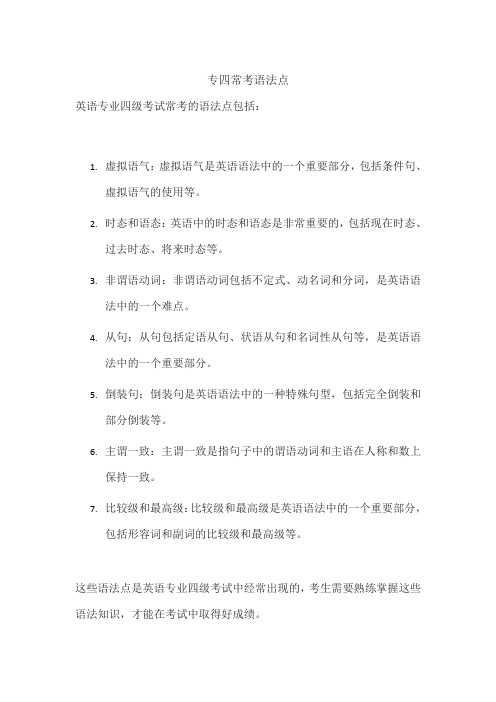
专四常考语法点
英语专业四级考试常考的语法点包括:
1.虚拟语气:虚拟语气是英语语法中的一个重要部分,包括条件句、
虚拟语气的使用等。
2.时态和语态:英语中的时态和语态是非常重要的,包括现在时态、
过去时态、将来时态等。
3.非谓语动词:非谓语动词包括不定式、动名词和分词,是英语语
法中的一个难点。
4.从句:从句包括定语从句、状语从句和名词性从句等,是英语语
法中的一个重要部分。
5.倒装句:倒装句是英语语法中的一种特殊句型,包括完全倒装和
部分倒装等。
6.主谓一致:主谓一致是指句子中的谓语动词和主语在人称和数上
保持一致。
7.比较级和最高级:比较级和最高级是英语语法中的一个重要部分,
包括形容词和副词的比较级和最高级等。
这些语法点是英语专业四级考试中经常出现的,考生需要熟练掌握这些语法知识,才能在考试中取得好成绩。
专四真题常考的语法进行总结
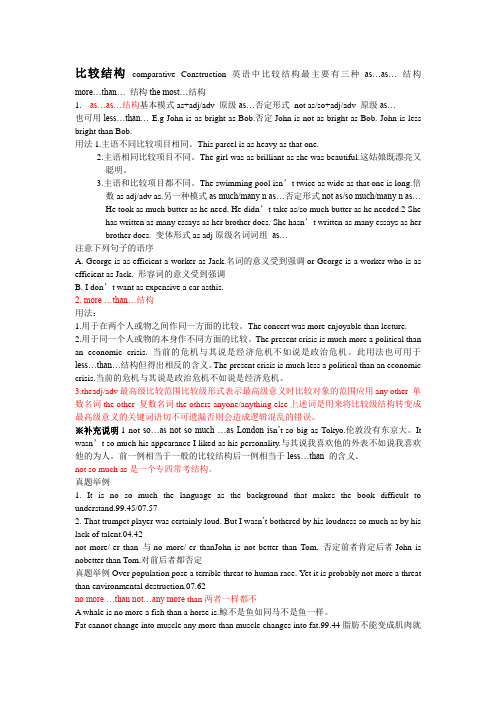
比较结构comparative Construction英语中比较结构最主要有三种as…as… 结构more…than… 结构the most…结构1.as…as…结构基本模式as+adj/adv 原级as…否定形式not as/so+adj/adv 原级as…也可用less…than… E.g John is as bright as Bob.否定John is not as bright as Bob. John is less bright than Bob.用法1.主语不同比较项目相同。
This parcel is as heavy as that one.2.主语相同比较项目不同。
The girl was as brilliant as she was beautiful.这姑娘既漂亮又聪明。
3.主语和比较项目都不同。
The swimming pool isn’t twice as wide as that one is long.倍数as adj/adv as.另一种模式as much/many n as…否定形式not as/so much/many n as…He took as much butter as he need. He didn’t take as/so much butter as he needed.2 She has written as many essays as her brother does. She hasn’t written as many essays as her brother does. 变体形式as adj原级名词词组as…注意下列句子的语序A. George is as efficient a worker as Jack.名词的意义受到强调or George is a worker who is as efficient as Jack. 形容词的意义受到强调B. I don’t want as expensive a car asthis.2. more …than…结构用法:1.用于在两个人或物之间作同一方面的比较。
英语专业四级语法重点汇总

英语专业四级语法重点汇总English英语专八专四学习复习资料英语专四语法重点汇总一、非谓语动词的主要考点1. 有些典型动词后面可以接上不定式或动名词来做宾语的,但是在意思上是有区别的,主要常考到的动词罗列如下:mean to do想要(做某事)VS mean doing意味(做某事)propose to do 打算(做某事)VS propose doing建议(做某事)forget to do忘记(要做的事)VS forget doing忘记(已做的事)remember to do记得(要做某事)VS remember doing记得(做过)go on to do继而(做另一件事)VS go on doing继续(做原来的事)stop to do停下来去做另一件事VS stop doing停止正在做的事regret to do(对将要做的事)遗憾VS regret doing(对已做过的事)后悔2. 不定式的习惯用法典型句型整理如下:如:“cannot help but do”——“不得不做某事”如:“cannot but do”——“不禁做某事”如:“cannot choose but do”——“不由自主地做某事”如:“can do nothing but do”——“不能不做某事”如:“have no choice but to do”——“只能做某事”如:“have no alternative but to do”——“只能做某事”例句:The boy cannot help but be greatly influenced by the useful instruction given by his family tutor.When I start my job career, I cannot choose but look back upon the beautiful days I spent on campus.3. 动名词的习惯用法典型动名词的习惯句型整理罗列如下:如:be busy/active doing sth.如:It’s no good/use doing sth.如:spend/waste time doing sth.如:have difficulty/trouble/problem doing sth.如:have a good/great/wonderful time doing sth.如:There is no point/sense/harm/ use doing sth.例句:There is no use crying over spilt milk.(典型例句)牛奶洒了,哭也没用;后悔是没有用的;覆水难受I really have problem solving these mathematic questions since I am not major in science after all.二、形容词与副词及其比较级1. 形容词的句法功能形容词通常在句子中用做定语、表语与主语的语法成分,通常考到的知识点总结如下:(1) 以“a”开头的形容词如“alone”、“alike”、“asleep”、“awake”等一般不能做前置定语,通常是做表语或后置定语的例句:Jerry didn’t pass the important final exam, please let him alone for the time being.Michael came back from job just now, and his eyes were shut and he seemed to have fallen asleep.(2) 某些以副词词缀“-ly”结尾的词其实是形容词,不能看错是副词,例如“friendly”、“leisurely”、“lovely”等(3) 下列动词既是实义动词又是系动词,注意用做系动词时,要求形容词做表语这些典型单词罗列如下:“remain”、“keep”、“become”、“get”、“grow”、“go”、“come”、“turn”、“stay”、“stand”、“run”、“prove”、“seem”、“appear”、“look”等例句:The situation remains tense between the two countries at this juncture. 在这个节骨眼上,两国形势仍然持续紧张。
专四语法总结
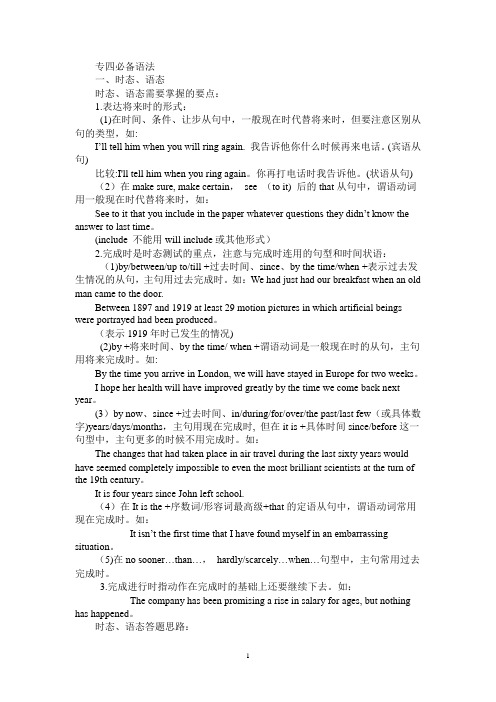
三、动名词
1.必须接动名词做宾语的动词
牢记下列要求接动名词做宾语的动词:
acknowledge, advocate, anticipate, appreciate,avoid,admit, confess, consider, delay, deny, enjoy,escape,excuse, fancy, favor, finish,forgive, imagine,involve, justify,mention, pardon,practice,postpone, recall,recollect,risk,resist,suggest,tolerate。如:
Between 1897 and 1919 at least 29 motion pictures in which artificial beings were portrayed had been produced。
(表示1919年时已发生的情况)
(2)by +将来时间、by the time/ when +谓语动词是一般现在时的从句,主句用将来完成时。如:
be said / reported / thought / believed / known / supposed + to do sth。
2。不定式做宾语
掌握要求接不定式做宾语的动词:
afford, arrange, attempt, claim, desire,determine,expect, fail, guarantee,endeavor, intend, pledge,pretend, resolve, request, swear, tend,venture。如:
专四语法汇总
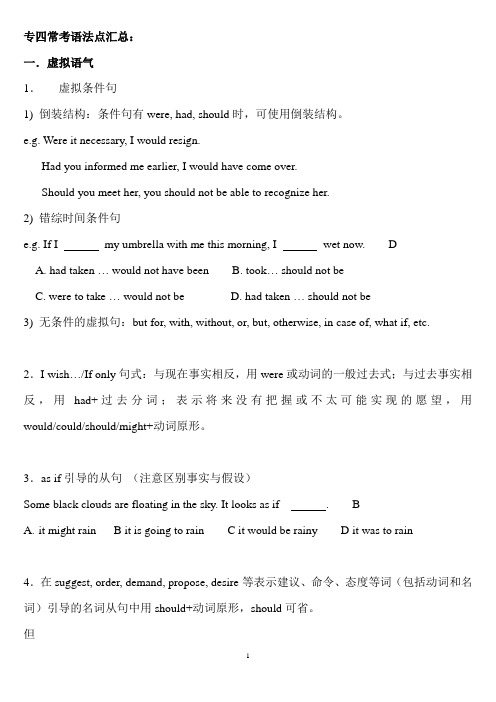
专四常考语法点汇总:一.虚拟语气1.虚拟条件句1) 倒装结构:条件句有were, had, should时,可使用倒装结构。
e.g. Were it necessary, I would resign.Had you informed me earlier, I would have come over.Should you meet her, you should not be able to recognize her.2) 错综时间条件句e.g. If I my umbrella with me this morning, I wet now. DA. had taken … would not have beenB. took… should not beC. were to take … would not beD. had taken … should not be3) 无条件的虚拟句:but for, with, without, or, but, otherwise, in case of, what if, etc.2.I wish…/If only句式:与现在事实相反,用were或动词的一般过去式;与过去事实相反,用had+过去分词;表示将来没有把握或不太可能实现的愿望,用would/could/should/might+动词原形。
3.as if引导的从句(注意区别事实与假设)Some black clouds are floating in the sky. It looks as if . BA.it might rain B it is going to rain C it would be rainy D it was to rain4.在suggest, order, demand, propose, desire等表示建议、命令、态度等词(包括动词和名词)引导的名词从句中用should+动词原形,should可省。
专四英语语法考点分析解析

语法考点之一:虚拟语气考点1. If从句中的虚拟语气1、与过去事实相反:从句sb had done,主句sb would(should, could, might)+ have done;2、省略if,从句的语序用到装,即将were, had或should移至主语的前面,但否定词not不前移。
3、与将来事实相反:从句sb did (should+do或were+to do),主句sb would (should, could, might)+do。
4、错综条件句:主句与从句的动作发生在不同的时间段。
比如:从句对过去虚拟,而主句对现在虚拟,即从句sb had done,主句sb would(should, could, might)+do;考点2:表示建议、要求、命令等动词如insist, order, command, suggest, advise, propose, ask, require, request, demand引导的从句和it引导的相应的分词、名词和形容词从句,谓语用(should)+动词原形。
考点3:It is +advisable, essential, important, imperative, incredible等从句,谓语用(should)+动词原形。
考点4:it is (high/about) time that的结构中,从句使用一般过去式。
例如:考点5:much as"尽管,虽然"引导让步状语从句,从句中用would have done表示假设。
考点6:if only, wish, as if/as though引导从句,与过去事实相反:had + done;与现在事实相反:动词过去式;与将来事实相反:could/would + do考点7:would rather/sooner从句中使用一般过去式或过去完成式分别表示对现在或过去的虚拟考点8:lest / for fear that+(should ) +原形动词。
专四应试技巧(语法词汇汇总篇)

专四应试技巧(语法词汇汇总篇)语法词汇篇1:集体名词作主语主谓一致集体名词作主语主谓一致1)通常作复数的集体名词集体名词,如:police, people, cattle, militia, poultry等,通常作复数,用复数动词。
如:Domestic cattle provide us with milk, beef and hides.2)通常作不可数名词的集体名词有些集体名词,如foliage, machinery, equipment, furniture, merchandise,通常作不可数名词,随后的动词用单数。
例如:All the machinery in the factory is made in China.3)既可作单数也可作复数的集体名词集体名词,如audience, committee, class, crew, family, public, government等,既可作单数,也可作复数用。
The city council is meeting to set its agenda.4)a committee,etc. of +复数名词如果主语是由“a committee of /a panel of /a board of +复数名词”构成,随后的动词通常用单数。
例如:A committee of five men and three women is to consider the matter.近义词辨析tired, exhausted, fatigued, weary, worn out这组词均含有“疲惫的”的意思。
tired可指因体力或脑力消耗太多而需要休息,还可指因长期做某事而失去兴趣。
Henry was so tired that he went to bed immediately after he got home.亨利很疲惫,一到家就上床睡觉去了。
英语专业四级语法汇总

语法回顾篇专四语法考点虚拟语气、情态动词、非谓语动词、复合句、倒装、小语法(省略,时态,反义疑问句,代词,强调句,主谓一致,冠词,形容词及副词)、as 的特殊用法。
专四英语语法考点串讲之一虚拟语气一般说来,有下列几种考点需要考生注意(十考点及两备考点)考点1. 与现在事实相反从句谓语动词用did(be用were),主句谓语动词would(should,could,might)+do;考点2. 与过去事实相反从句谓语动词用had done,主句谓语动词用would(should,could,might)+ have done;例如:43.I _________the party much more if there hadn‟t been quite such a crowd of people there.A. would enjoyB. will have enjoyedC. would have enjoyedD. will be enjoying49.All of us would have enjoyed the party much more if there _________ quite such a crowd of people there.A. weren‟tB. hasn‟t beenC. hadn‟t beenD. wouldn‟t考点3.与将来事实相反,从句谓语动词用:did(should+do或were + to do),主句谓语动词用:would(should,could,might)+do。
例如:43. If your car ___ any attention during the first 12 months, take it to an authorized dealer.(08年)• A. shall need C. would need• B. should need D. will need考点4. 时态的交叉现象,也就是主句与从句的动作发生在不同的时间段例如:If you had gone to see the doctor,you would be all right now.你要是早去看病,你现在就没事了。
专四备考资料词汇语法总结
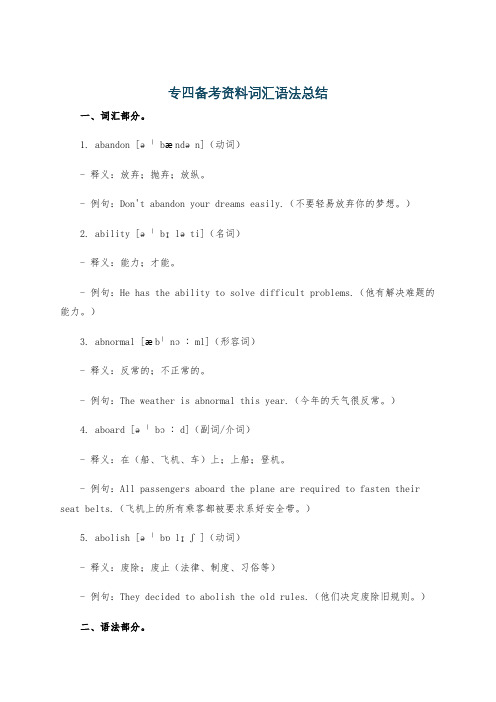
专四备考资料词汇语法总结一、词汇部分。
1. abandon [əˈbændən](动词)- 释义:放弃;抛弃;放纵。
- 例句:Don't abandon your dreams easily.(不要轻易放弃你的梦想。
)2. ability [əˈbɪləti](名词)- 释义:能力;才能。
- 例句:He has the ability to solve difficult problems.(他有解决难题的能力。
)3. abnormal [æbˈnɔːml](形容词)- 释义:反常的;不正常的。
- 例句:The weather is abnormal this year.(今年的天气很反常。
)4. aboard [əˈbɔːd](副词/介词)- 释义:在(船、飞机、车)上;上船;登机。
- 例句:All passengers aboard the plane are required to fasten their seat belts.(飞机上的所有乘客都被要求系好安全带。
)5. abolish [əˈbɒlɪʃ](动词)- 释义:废除;废止(法律、制度、习俗等)- 例句:They decided to abolish the old rules.(他们决定废除旧规则。
)二、语法部分。
1. 时态。
- 一般现在时。
- 结构:主语+动词原形(第三人称单数加 -s或 -es)- 用法:表示经常发生的动作、存在的状态或客观事实。
- 例句:He often goes to school by bike.(他经常骑自行车去上学。
)- 一般过去时。
- 结构:主语+动词的过去式。
- 用法:表示过去某个时间发生的动作或存在的状态。
- 例句:I saw him yesterday.(我昨天见到他了。
)- 现在进行时。
- 结构:主语+am/is/are+动词的 -ing形式。
- 用法:表示此时此刻正在进行的动作。
- 1、下载文档前请自行甄别文档内容的完整性,平台不提供额外的编辑、内容补充、找答案等附加服务。
- 2、"仅部分预览"的文档,不可在线预览部分如存在完整性等问题,可反馈申请退款(可完整预览的文档不适用该条件!)。
- 3、如文档侵犯您的权益,请联系客服反馈,我们会尽快为您处理(人工客服工作时间:9:00-18:30)。
专四必备语法一、时态、语态时态、语态需要掌握的要点:1.表达将来时的形式:(1)在时间、条件、让步从句中,一般现在时代替将来时,但要注意区别从句的类型,如:I’ll tell him when you will ring again. 我告诉他你什么时候再来电话。
(宾语从句)比较:I’ll tell him when you ring again.你再打电话时我告诉他。
(状语从句)(2)在make sure, make certain, see (to it) 后的that从句中,谓语动词用一般现在时代替将来时,如:See to it that you include in the paper whatever questions they didn’t know the answer to last time.(include 不能用will include或其他形式) 2.完成时是时态测试的重点,注意与完成时连用的句型和时间状语:(1)by/between/up to/till +过去时间、since、by the time/when +表示过去发生情况的从句,主句用过去完成时。
如:We had just had our breakfast when an old man came to the door.Between 1897 and 1919 at least 29 motion pictures in which artificial beings were portrayed had been produced.(表示1919年时已发生的情况) (2)by +将来时间、by the time/ when +谓语动词是一般现在时的从句,主句用将来完成时。
如:By the time you arrive in London, we will have stayed in Europe for two weeks.I hope her health will have improved greatly by the time we come back next year.(3)by now、since +过去时间、in/during/for/over/the past/last few(或具体数字)years/days/months,主句用现在完成时,如:The changes that had taken place in air travel during the last sixty years would have seemed completely impossible to even the most brilliant scientists at the turn of the 19th century.但在it is +具体时间since/before这一句型中,主句更多的时候不用完成时。
It is four years since John left school.(4)在It is the +序数词/形容词最高级+that的定语从句中,谓语动词常用现在完成时。
如:It isn’t the first time that I have found myself in an embarrassing situation.(5)在no sooner…than…, hardly/scarcely…when…句型中,主句常用过去完成时。
3.完成进行时指动作在完成时的基础上还要继续下去。
如:The company has been promising a rise in salary for ages, but nothing has happened.时态、语态答题思路:(1)先根据选项的区别点确定考题要点为时态,然后回到题句中寻找给出的或暗示的时间状语,缩小选择范围,进而选出正确答案;(2)根据谓语动词与句子主语或非谓语动词与其逻辑主语的关系,确定句子是主动语态还是被动语态。
二、不定式1.不定式做主语(1)引导逻辑主语的介词:不定式的逻辑主语一般由介词for引导,但下列表示人的性格行为特征的形容词做表语时, 不定式的逻辑主语则由of引导:absurd, bold, brave, courageous, careful, careless, clever, wise, foolish, silly, stupid, good, nice, kind, thoughtful, considerate, greedy, generous, honest, modest, polite, rude, cruel, selfish, lazy, wicked, wrong。
如:Experts say walking is one of the best ways for a person to stay healthy.It’s clever of you to have invented such a device.(2)不定式做主语补足语:掌握常用不定式做主语补足语的句型。
注意不定式表示的动作发生的时间,并采用相应形式。
如:be said / reported / thought / believed / known / supposed + to do sth.2.不定式做宾语掌握要求接不定式做宾语的动词:afford, arrange, attempt, claim, desire, determine, expect, fail, guarantee, endeavor, intend, pledge, pretend, resolve, request, swear, tend, venture。
如:Even though the children pretended to be asleep, the nurses were not deceived when they came into the room. 3.不定式做定语(1)被修饰的名词前有序数词、形容词最高级或next, last, only, not a, the, very等限定词时,该名词用不定式做定语。
如:the first woman to set foot on the moon 第一个登上月球的女性(2)如果其动词要求不定式做宾语,相应的名词一般用不定式做定语。
如:tendency to do→tend to do, decision to do→decide to doThis book is an attempt to help you use English and recognize how it is used.(3)如果其形容词形式要求接不定式做补语,相应的名词一般用不定式做定语。
如:ambition to do “干……的雄心”→be ambitious to do“有雄心干……”curiosity to do “对……的好奇心”→be curious to do“对……好奇”ability to do“做……的能力”→able to do“有能力做……”According to Darwin, random changes that enhance a species’ ability to survive are naturally selected and passed on to succeeding generation.(4)表示方式、原因、时间、机会、权利等名词用不定式做定语,这些名词包括:way, method, reason, time, place, chance, occasion, opportunity, evidence, power, right, movement, drive (运动),effort等。
如:I worked so late in the office last night that I hardly had time to catch the last bus.We appreciate your efforts to bring about a comprehensive solution to the existing problem.(5)不定代词something, nothing, little, much, a lot习惯上用不定式做定语。
如:Though we have made great progress, there is still much to be improved.4.不定式做状语不定式做状语主要表示目的、程度、结果、方式。
(1)in order to(do), so as to(do)结构引导目的状语,so as to不能臵于句首。
如:(2)so…as to, such…as to, enough…to, too…to结构做程度状语。
如:The solution works only for couples who are self-employed, don’t have small children and get along well enough to spend most of their time together.The vocabulary and grammatical differences between British and American English are so trivial and few ashardly to be noticed.(3)不定式做结果状语只能出现在句子的末尾,表示不愉快的结果,有时用only加强语气。
常见的不定式动词有find, hear, see, be told, form, give, make, produce等。
如:Greatly agitated, I rushed to the apartment and tried the door, only to find it locked.(4)not/never too… to, too… not to, but/only too…to, too ready/eager/apt/inclined to表示肯定意义。
如:I am only too pleased to hear from you further. 能再听到你的消息,我太高兴了。
三、动名词1.必须接动名词做宾语的动词牢记下列要求接动名词做宾语的动词:acknowledge, advocate, anticipate, appreciate, avoid, admit, confess, consider, delay, deny, enjoy, escape, excuse, fancy, favor, finish, forgive, imagine, involve, justify, mention, pardon, practice, postpone, recall,recollect,risk, resist, suggest, tolerate。
